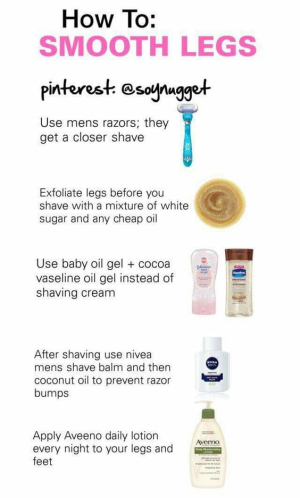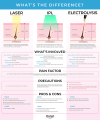No edit summary |
Unusualcrow (talk | contribs) mNo edit summary |
||
| (3 intermediate revisions by 2 users not shown) | |||
| Line 1: | Line 1: | ||
[[Category:Hair Care]] | |||
Body hair | There are different ways of removing hair which vary in effectiveness and recommended areas to use them on. | ||
Body hair is typically softer and finer than facial hair. However, some areas, like the underarms, legs, or pubic region, have coarser terminal hair. | |||
Facial hair (beard, mustache) in individuals who have gone through male puberty is usually thicker and coarser. Scalp hair is also a form of terminal hair and is dense and thick. | Facial hair (beard, mustache) in individuals who have gone through male puberty is usually thicker and coarser. Scalp hair is also a form of terminal hair and is dense and thick. | ||
| Line 21: | Line 23: | ||
Stretching the skin before shaving, shaving against the grain or use of blunt blades may also increase the chance of transfollicular penetration. Dry shaving (no prior moisturization of the hair) with razors usually produces sharp beveled tips encouraging extra-follicular penetration. The use of pre-shave care with warm water or other pre-shave care regimes, improves hydration of the hair shaft causing it to swell, thus ending up with blunt edges after shaving<ref>https://www.ncbi.nlm.nih.gov/pmc/articles/PMC6585396/</ref> | Stretching the skin before shaving, shaving against the grain or use of blunt blades may also increase the chance of transfollicular penetration. Dry shaving (no prior moisturization of the hair) with razors usually produces sharp beveled tips encouraging extra-follicular penetration. The use of pre-shave care with warm water or other pre-shave care regimes, improves hydration of the hair shaft causing it to swell, thus ending up with blunt edges after shaving<ref>https://www.ncbi.nlm.nih.gov/pmc/articles/PMC6585396/</ref> | ||
# | # Prepare skin properly by first cleansing, exfoliating (mechanical or chemical) to remove dead skin, then soften the hairs with warm water or pre-shave oil | ||
# | # Use a good lubricant. Creams, gels, and especially oils makes razors glide smoothly and evenly, and act as a protective layer. | ||
# | # Use a clean, sharp razor. The less passes you have to do, the better. If cartridge razors give you bumps, try using a single blade safety razor (aka double edge razor) and go slow, clearing the blade often. Switch blades regularly, and disinfect the blade with isopropyl alcohol if you reuse. | ||
# | # Rinse with cold water after shaving to reduce redness and inflammation. Apply thick moisturizer or shaving balm afterwards. | ||
# | # Exfoliate and moisturize each subsequent day. Use a mechanical exfoliate like a pad or glove, or a chemical exfoliant. If you still get a few razor bumps within the next few days, they can be released by carefully pulling up the hair with tweezers, or possibly through scrubbing motions during mechanical exfoliation. | ||
Glycolic acid as a chemical | Glycolic acid as a chemical exfoliant is useful to prevent razor bumps. Salicylic (SA) acid, commonly found in face cleansers, is also good but may cause irritation depending on your skin. | ||
Latest revision as of 18:07, 14 December 2023
There are different ways of removing hair which vary in effectiveness and recommended areas to use them on.
Body hair is typically softer and finer than facial hair. However, some areas, like the underarms, legs, or pubic region, have coarser terminal hair.
Facial hair (beard, mustache) in individuals who have gone through male puberty is usually thicker and coarser. Scalp hair is also a form of terminal hair and is dense and thick.
Comparison of hair removal types
The permanence of hair removal depends on the method and how it affects the follicle and the type of hair.
Preventing razor bumps when shaving

Razor bumps aka pseudofolliculitis barbae are hairs becoming ingrown after mechanical shaving. When you shave you get rid of some stratum corneum layer, and you cut the hair strand right at this level or below it. when too much pressure is applied it pushes the strand below the topmost skin layer the tip can get stuck and curve into the skin causing papules, pustules, inflammation and hyperpigmentation.
Stretching the skin before shaving, shaving against the grain or use of blunt blades may also increase the chance of transfollicular penetration. Dry shaving (no prior moisturization of the hair) with razors usually produces sharp beveled tips encouraging extra-follicular penetration. The use of pre-shave care with warm water or other pre-shave care regimes, improves hydration of the hair shaft causing it to swell, thus ending up with blunt edges after shaving[1]
- Prepare skin properly by first cleansing, exfoliating (mechanical or chemical) to remove dead skin, then soften the hairs with warm water or pre-shave oil
- Use a good lubricant. Creams, gels, and especially oils makes razors glide smoothly and evenly, and act as a protective layer.
- Use a clean, sharp razor. The less passes you have to do, the better. If cartridge razors give you bumps, try using a single blade safety razor (aka double edge razor) and go slow, clearing the blade often. Switch blades regularly, and disinfect the blade with isopropyl alcohol if you reuse.
- Rinse with cold water after shaving to reduce redness and inflammation. Apply thick moisturizer or shaving balm afterwards.
- Exfoliate and moisturize each subsequent day. Use a mechanical exfoliate like a pad or glove, or a chemical exfoliant. If you still get a few razor bumps within the next few days, they can be released by carefully pulling up the hair with tweezers, or possibly through scrubbing motions during mechanical exfoliation.
Glycolic acid as a chemical exfoliant is useful to prevent razor bumps. Salicylic (SA) acid, commonly found in face cleansers, is also good but may cause irritation depending on your skin.





